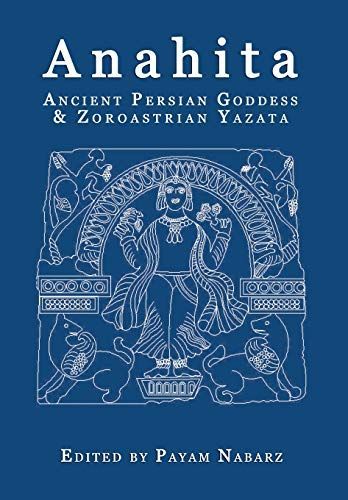
Anahita Ancient Persian Goddess and Zoroastrian Yazata
The Indo-Iranian Anahita is an ancient Persian Goddess, who became a Zoroastrian Yazata (or Angel) and is still part of contemporary Zoroastrianism. Described as a beautiful maiden, who is strong, tall and pure, she is depicted as wearing a mantle embroidered with gold and as holding the baresma (sacred plant) in her hand. She is the Goddess of all the waters upon the earth, her full title being Aredvi Sura Anahita which means moist, mighty and immaculate (pure), and she travels on her chariot pulled by four horses: Wind, Rain, Cloud and Sleet. Closely associated with the King's investiture she is a Goddess of Sovereignty, thought by some to be the Persian Aphrodite, who also has some remarkable similarities to numerous other ancient goddesses, including Ishtar, Venus, Nana and Isis. Anahita: Ancient Persian Goddess and Zoroastrian Yazata is a collection of papers, art and poetry celebrating this fascinating Goddess from more than 25 esteemed international academics, Zoroastrians, artists and writers. Each in turn share their research and insights leading the reader on a journey of discovery - from the Achaemenid Royal Inscriptions featuring Anahita and Mithra, to the possible relationships between Anahita and the Dame du Lac of Arthurian Legend, representations of her in Sassanian art, William Morris Hunt through to Anahita as the pre-Christian Virgin Mother of Mithra, as well as her role in purification and purity. Studies of the Sassanian rock reliefs, hot mineral springs, and her water ritual in Mah y na Buddhism, in addition to an examination of the Sassanid stucco discovered in the Barz-e-qawela in Lorestan province of Iran and women in ancient Elam are all brought together illustrating the significance of Anahita throughout Persian and Middle Eastern history. This book is the most extensive study of the figure of Anahita in recent years, and includes new and never published before research. Anahita: Ancient Persian Goddess and Zoroastrian Yazata is essential reading for all those interested not just in this Goddess and her history, but also all those interested in Persian and Middle Eastern history. Contributors include: Dr. Israel Campos Mendez, Dr. Kaveh Farrokh, Dr. Matteo Compareti, Sheda Vasseghi, D.M. Murdock, Dr. Sam Kerr, Rahele Koulabadi, Dr. Seyyed Rasool Mousavi Haji, Morteza Ataie, Seyed Mehdi Mousavi Kouhpar, Seyyed Sadrudin Mosavi Jashni, Farhang Khademi Nadooshan, Hassan Nia, Masoud Sabzali, Dr. Masato Tojo, Behzad Mahmoudi, Amir Mansouri, Dr Kamyar Abdi, Dr Gholamreza Karamian, Maryam Zour, Saman Farzin, Babak Aryanpour, Reza MehrAfarin, Akashanath, Shapour Suren-Pahlav, Ana C. Jones, Katherine Sutherland, and Dr. Payam Nabarz.